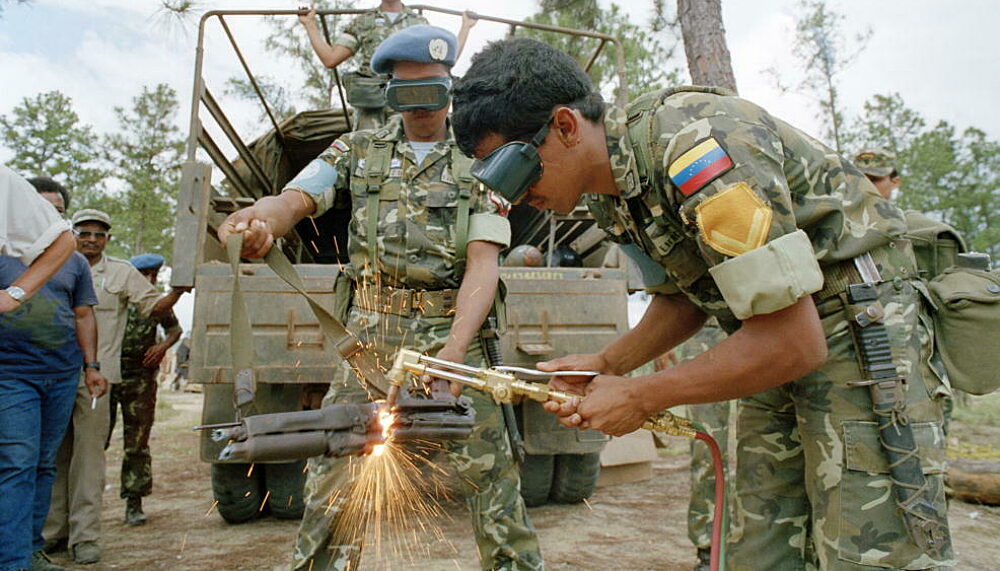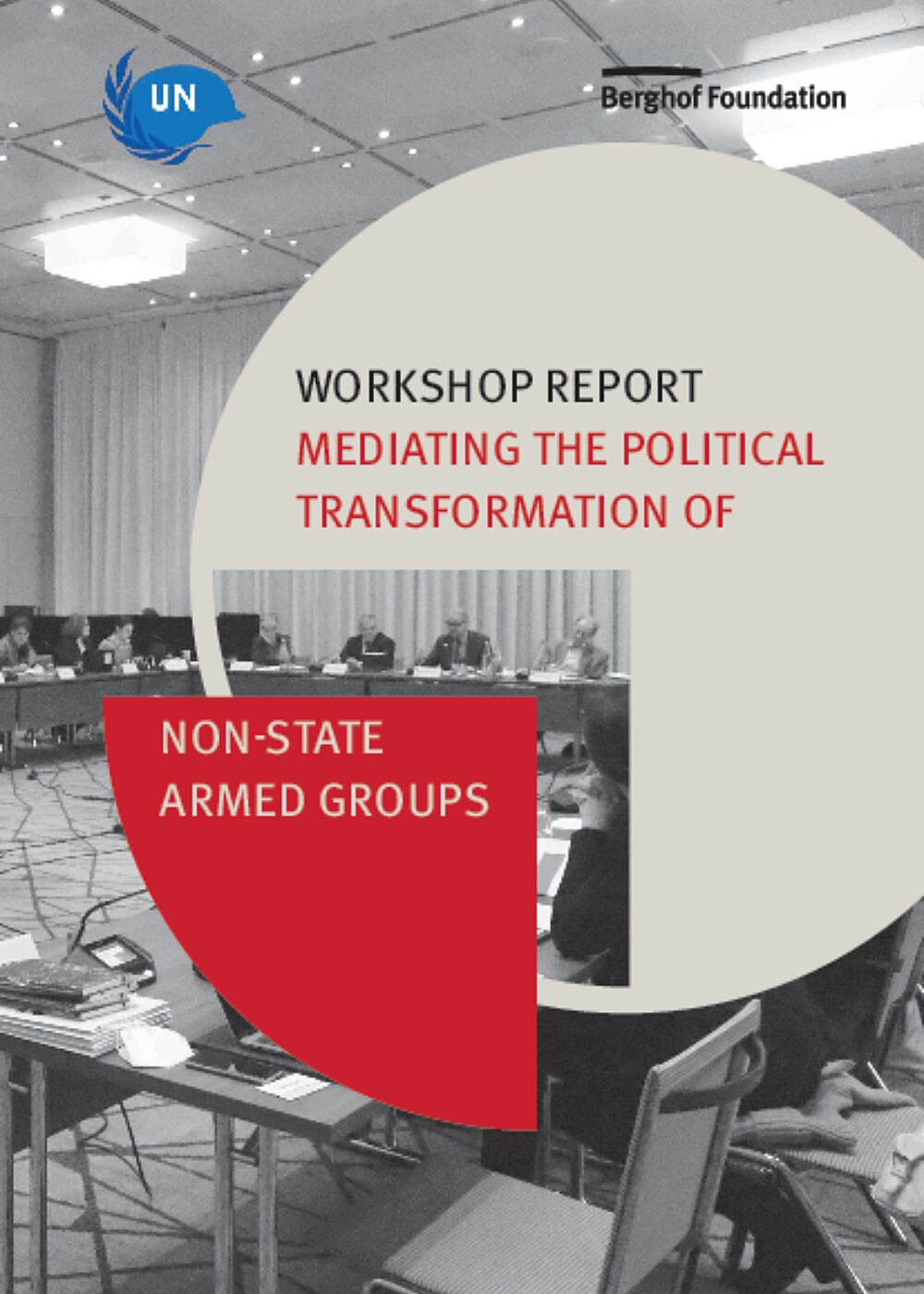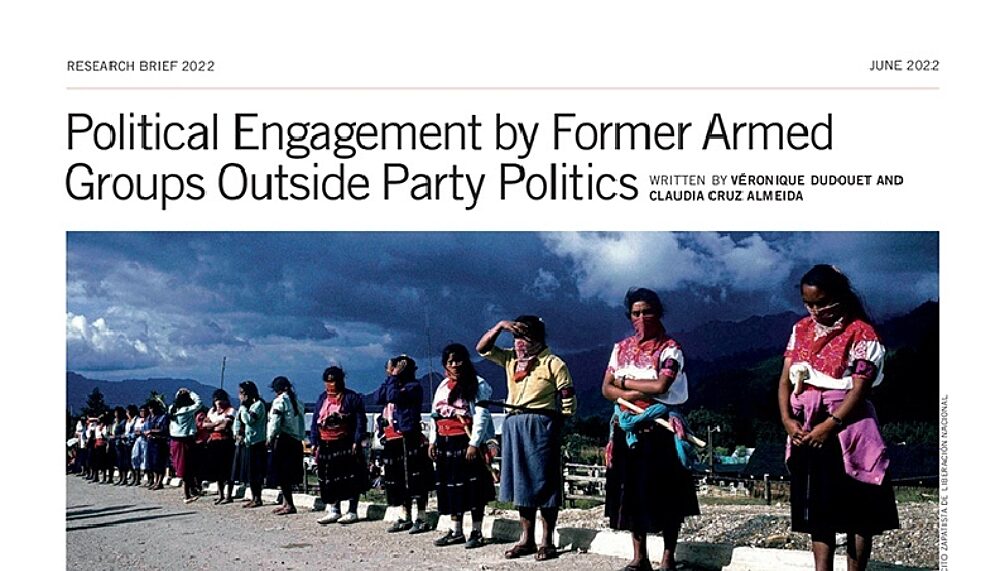FEATURE | 8 Jul 2022
From combatants to politicians
How peacebuilders can support the political transformation of armed groups

Together with the United Nation's DDR Section, we support formerly armed groups in becoming peaceful political parties after wars.
Nobody takes up arms and fights for no reason – many non-state armed groups act on political claims and grievances, seeking self-governance, representation, or an end to oppression. Consequently, supporting the transformation of these groups into peaceful political entities is a crucial part of building sustainable peace.
In fact, over one third of all armed groups who signed peace agreements since 1975 continued to operate as political parties after violent conflict ended. Even outside of formal peace accords, or even if the group as a whole failed to become a political party, most leaders of former armed groups have taken political positions in executive, legislative or other state bodies. We saw a very recent example of such transformations in June 2022, when Gustavo Petro, a former guerrilla commander, became the new President of the Republic of Colombia, three decades after his movement, the Movimiento 19 de Abril or M-19, signed a peace accord with the government.
In order for such transformations to be successful, armed groups ought to undergo two main changes: they must be willing to demobilise their military apparatus, and they need to continue their political engagement through active participation in their country’s legal and democratic framework. International organisations, donor agencies and NGOs can play an important role in supporting these transitions ‘from bullets to ballots’.
Disarmament, demobilisation and reintegration (DDR) programmes by institutions like the United Nations have become institutionalised tools to facilitate the civilian trajectory of former combatants after the end of a violent conflict. Nevertheless, to-date there are no support initiatives for non-state armed actors to channel their claims through non-violent political engagement, or to transform their group structures into a political party. These two aspects – DDR and political transformation – are often mutually dependent and constitute two sides of the same coin. Research shows that it threatens the sustainability of peace, if former combatants lack the opportunity to exercise their political rights and shape local or national governance.

Together with the DDR Section of the United Nations Department of Peace Operations (UN DPO), we set out to close this gap by exploring avenues for the international community to better support the transformation of non-state armed groups into peaceful political actors. Our joint project also contributes to the operationalisation of the new module of the UN’s International DDR Standards (IDDRS) on the politics of DDR.
In a first step, we brought together prominent mediators, DDR practitioners and political transformation scholars at a workshop in Berlin in December 2021. This was the first time that representatives from these three communities jointly discussed the design of DDR and political transformation during peace processes. Based on insights from relevant country cases, such as Colombia, the Democratic Republic of the Congo, Mali and the Philippines, experts compared different political transformation pathways – collective ones, when groups transformed to become parties, as well as individual transitions to become politicians – and they explored how international support can be successful.
The workshop clearly showed the complementary roles that mediation, DDR and peacebuilding professionals can play throughout the negotiation and implementation stages of such processes. DDR programmes, for example, can offer civic education and capacity-building programmes for rank-and-file combatants and mid-level commanders to facilitate their political (re)integration, while political foundations and NGOs can help newly-formed political parties to participate effectively in electoral processes and state institutions.
It also made clear that the strategic, psychological and security challenges combatants face when they leave behind armed militancy and embrace peaceful politics can be addressed most fruitfully, if international peace support actors coordinate their interventions and work closely together. Read more about the outcomes of the experts’ discussions in our workshop report.
Yesterday, to inaugurate the #DDRSymposium 2022, @BerghofFnd & DDRS organized an event on the political transformation of armed groups, where combatants turned politicians shared their experience & gave insights on how to provide international support to such processes. #DDRWeek pic.twitter.com/HG91AlWdKZ
— Alexandre Zouev (@UN_OROLSI) June 21, 2022
In a second step, we organised a policy event at the UN Secretariat in New York together with the UN DPO DDR section, to shed light on the experiences of first-hand witnesses of political transformation processes. Five politicians from Latin America, Europe and Asia shared their personal testimonies on the challenges and opportunities of transitioning from armed insurgency to state-building.
Their stories demonstrate that effective political transformation is a central component of peace processes. When former fighters become political leaders and former armed groups become political parties, it can enhance the sustainability of peacebuilding, prevent a relapse into violence, and offer inclusive pathways for economic development and democracy after wars end. But their experiences also show that any political transformation process needs to be anchored in a gender-inclusive and human rights-based approach.

In a third step, we jointly organised an event that was part of the UN’s annual DDR symposium where researchers and practitioners discussed the political dynamics of DDR. Convened in partnership with the Folke Bernadotte Academy and the Politics after War network, this exchange provided an opportunity for senior officials of UN DDR missions to learn from researchers about scientific evidence on the transformative dynamics of armed groups and combatants.
Our colleagues Véronique Dudouet and Claudia Cruz Almeida contributed a report on multiple pathways for political re-mobilisation of former combatants outside of party politics to a new research brief series
that launched at the event. Using examples from Latin America, in this article, they demonstrate that civil society organisations, such as veteran associations or grassroots social movements, allow ex-fighters – especially those from marginalised groups – to remain politically engaged and to shape local and national governance, while avoiding the hurdles of electoral competition.
To learn more about our activities on the political transformation on non-state armed groups, read more about our work here, and watch our video series produced together with the UN DPO DDR section. In these clips, former members of armed groups from Aceh, Colombia, Kosovo, Mali, Nepal, and Sudan, share how they became political leaders and what they experienced during demobilisation and disarmament processes.
Media contact
You can reach the press team at:
+49 (0) 177 7052758
email hidden; JavaScript is required


